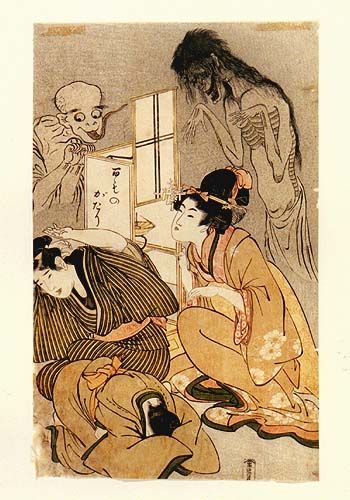I love Japanese films of the 1960s and Hulu with its Criterion Collection has many Japanese Cinema classics that at the right time can be watched for free. I recently saw a movie, Kwaidan (1965), at Hulu that was based on Hearn's writings. The movie is an anthology of four Japanese Ghost stories that Hearn made popular not only in the West but in Japan through his books. After seeing the movie, I decided to read Mr. Hearn.
Kwaidan: Stories and Studies of Strange Things contains two of the stories in the movie which has four stories in it. The other two movie stories are from other books by Mr. Hearn.
The main story in the movie, and it is also the main story in the book, is about a Japanese bard (he plays an instrument and sings or recites a long epic poem that he has composed about a dynastic power struggle over the Emperor of Japan in Medieval Times between two powerful and power hungry families), consider him to be the equivalent of a Homer who sings of arms and a man---no that was Virgil who wrote his epic about the fall of Troy. The Japanese bard is blind like Homer (Virgil could see) and recites a poem about the battle fought for Japan. The Japanese bard is housed by a Buddhist Temple and performs there for his keep until very late one dark and stormy night, or on a very dark night, but what does the bard care about that? He can't see anything that is dark or light.
Anyway, a samurai from a great family shows up at the Buddhist Temple and commands the bard to come with him and perform his epic tale before his master's household that is visiting the battleground where the ancient battle for Japan took place which is conveniently near the Temple. This epic poem of the bard is so long that it takes six nights of performing to complete. The master and household are impressed with the bard after the first night and claim him for the remaining nights. No one talks of money at this time, I suppose it is rude to do so before the climax, rather like some other money transactions.
After the second night or so, the Priest of the Temple becomes suspicious about all this night time entertaining and sends some of his flunkies to find out who the Great Master is. The Priest will be the Collection Agency, I suppose. Well, what do you know? The flunkies find out that the bard is sitting in the rain in the battleground graveyard performing his heart out with no one and nothing in attendance but a bunch of Marsh Lights or Fire Flies or Ghosts with Sparklers. It is the Ghosts with Sparklers that concern the Priest.
The Ghosts are the Losing side of the Great Battle and the grave yard contains their headstones but not their bodies because the great battle took place on the sea and the losing side all jumped off their boats and drowned themselves along with the Baby Emperor of Japan. I don't think that the Baby Emperor had much of a choice about living or dying. And I don't think a Baby is much ashamed or shamed by anything, but he did what his Nanny made him do.
The Priest is perturbed by the Ghost Audience and has a conversation with the bard about the implications of his performance for them. There will be no money at the end of it, there will be the bard's death. This reminds me of the metaphor for masturbation, ("It will blind you, Boy") but then it can't apply because the bard is already blind. Or, maybe that is how he became blind, but never mind, that is beyond the purveyance of this story. Any purveying done herewith will require the life of the bard.
The Priest paints the bard with prayers and spells all over his body to protect him from his fearsome fans and tells the bard to go no more with their escort. So the next night, the bard is waiting and ready not to perform. There is only one problem---there always is, isn't there? The Priest forgot to paint the ears of the bard with the protective prayers and spells. I won't tell the rest of the story, but I did wonder about a blind and deaf bard. Now, there are some handicaps to overcome for a career in the performing arts.
The second story for movie from this book is about what happens to two woodcutters in the Dead of Winter. There is a reason why it is called the "Dead" of Winter.
The book also contains other less cinematic ghost stories and the ghosts don't always have to be human. Willow trees can produce a ghost in Japan. There are spirits all around and they can get nasty for no good reasons.
The end of the book has some haiku about butterflies and mosquitoes and ants. My favorite was:
When I saw the fallen flower return to the branch
---lo! it was only a butterfly!

No comments:
Post a Comment